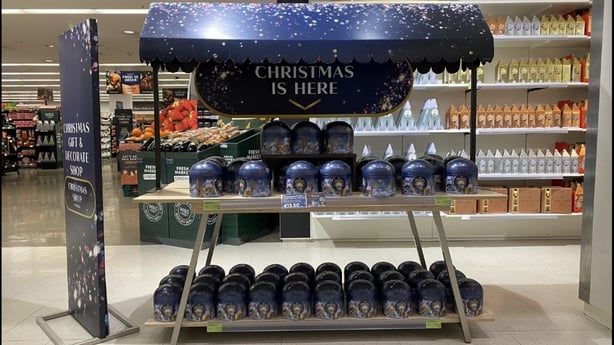The price of your grocery bill might be frightening, but are you also horrified at the sight of Christmas selection boxes in the supermarket long before you have even thought of buying a pumpkin for Halloween?
Is there anything scarier in the shopping aisles than Christmas candles and decorations beside Halloween skeletons and jack o' lanterns?
Is it a trick or treat?
Dermott Jewell, Policy and Council Advisor with the Consumer Association of Ireland, believes the "vast majority of people don't like it".
"Some see it as a benefit because there is a limited amount of time leading up to Christmas but most people, parents especially, find it a source of frustration," Mr Jewell said.
"The summer holidays are only over and suddenly they're talking about Christmas."
"It's been happening since early September, with selection boxes at the door. Then as soon as Christmas is over, there are Easter eggs on the shelves."

The retail sector, however, is experiencing many challenges in the 'Golden Quarter' - the three months before Christmas that shops and supermarkets rely on to generate sales and profits.
Consumer confidence is at a 14-year low with concerns around increases in energy bills and a rise in grocery inflation.
"People are now shopping early for Christmas and buying when they can afford to spend," according to Damian O'Reilly, senior lecturer in retail management at Technological University Dublin (TUD).
Retailers anticipated that consumers would want to spread the cost of Christmas and they were duly prepared.
"We're sensing that customers are ready to celebrate Christmas earlier this year," said Tesco Ireland, customer director, Cathal Deavy.
"In light of increased cost of living, our customers have told us that they want to spread the cost of Christmas this year and we've reacted to that by offering a select range of Christmas products from September."
Tesco supermarkets have seen demand for products with a longer shelf life, like tubs of sweets, selection boxes and tins of biscuits, which can be picked up and stored at home.
It's a similar picture in Aldi stores.
John Curtin, Aldi group buying director, said their stores are focusing on Halloween, but "that said, we have already launched some of customers’ favourite chocolate tubs ahead of Christmas including Cadbury’s Roses and Nestle Quality Street."
He said Aldi "will be ramping up the Christmas preparations over the next 10 weeks."
Traditionally, Christmas shopping began on December 8, but those days are long gone.

Brown Thomas opened its Christmas Shop on Grafton Street on August 18, and the Arnotts' Christmas Shop opened on September 15.
A spokesperson for Brown Thomas said the Christmas Shop opens in August every year due to customer demand.
"We find that there are many customers who are keen to get organised early by snapping up the most unique decorations," the spokesperson said.
"This year has proven to be no different and has exceeded expectations."
Retail Excellence said Christmas stock is selling now because some shoppers want to be well prepared while stocks last while others are thinking about cashflow.
Managing director Duncan Graham said retailers are conscious that many consumers might not like seeing Christmas goods in stores so early, but he added that equally this is a particularly important time of year.
"Retailers are not overpromoting Christmas, but they need to advertise what is for sale as we are in a very competitive environment and no retailer wants to lose out by delaying sales," Mr Graham said.
He pointed out that clothing retailers offer t-shirts and shorts for sale in March, "when in reality, consumers won't need them until the summer".
"The market drives retailers’ sales decisions and we always see sales ahead of time."
TUD's Damian O'Reilly acknowledged that older generations see Christmas as beginning earlier each year.
But the values of younger generations are different because they are used to seeing offers online throughout the year.
Black Friday has also been embraced by consumers on this side of the Atlantic, which played its part in elongating the Christmas trading period.
Regardless of how early shops stock up for Christmas, the war in the Ukraine coupled with high inflation will result in consumers being careful with how and where they spend their money, which he said will inevitably result in consumers spending less and buying fewer items.
"Many retailers will believe that they are overstocked and may have early promotions and deals to offload excess stocks. I believe we will see large amounts of discounting and markdowns," Mr O'Reilly said.
After the pandemic, retailers will hope for a normal Christmas - the first in three years.
Mr O'Reilly believes gifting will be better focused on what people want and what is functional.
"Throws, blankets and jumpers will see a significant rise in sales as will other items - electrical or otherwise - that are alternatives to turning up the heating," he predicted.
He said overall, there is cautious optimism for Christmas for most retailers with the grocery sector doing well as families get together.
"However, I believe that early 2023 will see a significant reduction in consumer spending and many SME retailers will find it difficult to survive."







